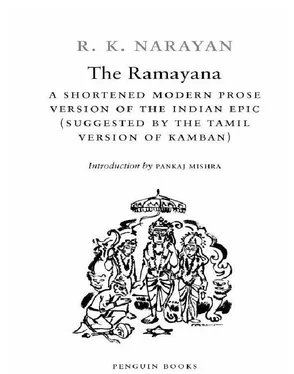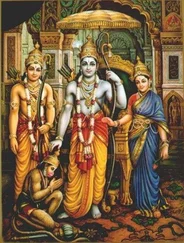Махариши Вальмики - The Ramayana
Здесь есть возможность читать онлайн «Махариши Вальмики - The Ramayana» весь текст электронной книги совершенно бесплатно (целиком полную версию без сокращений). В некоторых случаях можно слушать аудио, скачать через торрент в формате fb2 и присутствует краткое содержание. Жанр: Старинная литература, на английском языке. Описание произведения, (предисловие) а так же отзывы посетителей доступны на портале библиотеки ЛибКат.
- Название:The Ramayana
- Автор:
- Жанр:
- Год:неизвестен
- ISBN:нет данных
- Рейтинг книги:3 / 5. Голосов: 1
-
Избранное:Добавить в избранное
- Отзывы:
-
Ваша оценка:
- 60
- 1
- 2
- 3
- 4
- 5
The Ramayana: краткое содержание, описание и аннотация
Предлагаем к чтению аннотацию, описание, краткое содержание или предисловие (зависит от того, что написал сам автор книги «The Ramayana»). Если вы не нашли необходимую информацию о книге — напишите в комментариях, мы постараемся отыскать её.
The Ramayana — читать онлайн бесплатно полную книгу (весь текст) целиком
Ниже представлен текст книги, разбитый по страницам. Система сохранения места последней прочитанной страницы, позволяет с удобством читать онлайн бесплатно книгу «The Ramayana», без необходимости каждый раз заново искать на чём Вы остановились. Поставьте закладку, и сможете в любой момент перейти на страницу, на которой закончили чтение.
Интервал:
Закладка:
Ravana was weakening in spirit. He realized that he was at the end of his resources. All his learning and equipment in weaponry were of no avail and he had practically come to the end of his special gifts of destruction. While he was going down thus, Rama’s own spirit was soaring up. The combatants were now near enough to grapple with each other and Rama realized that this was the best moment to cut off Ravana’s heads. He sent a crescent-shaped arrow which sliced off one of Ravana’s heads and flung it far into the sea, and this process continued; but every time a head was cut off, Ravana had the benediction of having another one grown in its place. Rama’s crescent-shaped weapon was continuously busy as Ravana’s heads kept cropping up. Rama lopped off his arms but they grew again and every lopped-off arm hit Matali and the chariot and tried to cause destruction by itself, and the tongue in a new head wagged, uttered challenges, and cursed Rama. On the cast-off heads of Ravana devils and minor demons, who had all along been in terror of Ravana and had obeyed and pleased him, executed a dance of death and feasted on the flesh.
Ravana was now desperate. Rama’s arrows embedded themselves in a hundred places on his body and weakened him. Presently he collapsed in a faint on the floor of his chariot. Noticing his state, his charioteer pulled back and drew the chariot aside. Matali whispered to Rama, “This is the time to finish off that demon. He is in a faint. Go on. Go on.”
But Rama put away his bow and said, “It is not fair warfare to attack a man who is in a faint. I will wait. Let him recover,” and waited.
When Ravana revived, he was angry with his charioteer for withdrawing, and took out his sword, crying, “You have disgraced me. Those who look on will think I have retreated.” But his charioteer explained how Rama suspended the fight and forebore to attack when he was in a faint. Somehow, Ravana appreciated his explanation and patted his back and resumed his attacks. Having exhausted his special weapons, in desperation Ravana began to throw on Rama all sorts of things such as staves, cast-iron balls, heavy rocks, and oddments he could lay hands on. None of them touched Rama, but glanced off and fell ineffectually. Rama went on shooting his arrows. There seemed to be no end of this struggle in sight.
Now Rama had to pause to consider what final measure he should take to bring this campaign to an end. After much thought, he decided to use “Brahmasthra,” a weapon specially designed by the Creator Brahma on a former occasion, when he had to provide one for Shiva to destroy Tripura, the old monster who assumed the forms of flying mountains and settled down on habitations and cities, seeking to destroy the world. The Brahmasthra was a special gift to be used only when all other means had failed. Now Rama, with prayers and worship, invoked its fullest power and sent it in Ravana’s direction, aiming at his heart rather than his head; Ravana being vulnerable at heart. While he had prayed for indestructibility of his several heads and arms, he had forgotten to strengthen his heart, where the Brahmasthra entered and ended his career.
Rama watched him fall headlong from his chariot face down onto the earth, and that was the end of the great campaign. Now one noticed Ravana’s face aglow with a new quality. Rama’s arrows had burnt off the layers of dross, the anger, conceit, cruelty, lust, and egotism which had encrusted his real self, and now his personality came through in its pristine form—of one who was devout and capable of tremendous attainments. His constant meditation on Rama, although as an adversary, now seemed to bear fruit, as his face shone with serenity and peace. Rama noticed it from his chariot above and commanded Matali, “Set me down on the ground.” When the chariot descended and came to rest on its wheels, Rama got down and commanded Matali, “I am grateful for your services to me. You may now take the chariot back to Indra.”
Surrounded by his brother Lakshmana and Hanuman and all his other war chiefs, Rama approached Ravana’s body, and stood gazing on it. He noted his crowns and jewellery scattered piecemeal on the ground. The decorations and the extraordinary workmanship of the armour on his chest were blood-covered. Rama sighed as if to say, “What might he not have achieved but for the evil stirring within him!”
At this moment, as they readjusted Ravana’s blood-stained body, Rama noticed to his great shock a scar on Ravana’s back and said with a smile, “Perhaps this is not an episode of glory for me as I seem to have killed an enemy who was turning his back and retreating. Perhaps I was wrong in shooting the Brahmasthra into him.” He looked so concerned at this supposed lapse on his part that Vibishana, Ravana’s brother, came forward to explain. “What you have achieved is unique. I say so although it meant the death of my brother.”
“But I have attacked a man who had turned his back,” Rama said. “See that scar.”
Vibishana explained, “It is an old scar. In ancient days, when he paraded his strength around the globe, once he tried to attack the divine elephants that guard the four directions. When he tried to catch them, he was gored in the back by one of the tuskers and that is the scar you see now; it is not a fresh one though fresh blood is flowing on it.”
Rama accepted the explanation. “Honour him and cherish his memory so that his spirit may go to heaven, where he has his place. And now I will leave you to attend to his funeral arrangements, befitting his grandeur.”
13
INTERLUDE
To Link Up the Narrative, an Extract from “Valmiki” 12After the death of Ravana, Rama sent Hanuman as his emissary to fetch Sita. Sita was overjoyed. She had been in a state of mourning all along, completely neglectful of her dress and appearance, and she immediately rose to go out and meet Rama as she was. But Hanuman explained that it was Rama’s express wish that she should dress and decorate herself before coming to his presence.
A large crowd pressed around Rama. When Sita eagerly arrived, after her months of loneliness and suffering, she was received by her husband in full view of a vast public. She felt awkward but accepted this with resignation. But what she could not understand was why her lord seemed preoccupied and moody and cold. However, she prostrated herself at his feet, and then stood a little away from him, sensing some strange barrier between herself and him.
Rama remained brooding for a while and suddenly said, “My task is done. I have now freed you. I have fulfilled my mission. All this effort has been not to attain personal satisfaction for you or me. It was to vindicate the honour of the Ikshvahu race and to honour our ancestors’ codes and values. After all this, I must tell you that it is not customary to admit back to the normal married fold a woman who has resided all alone in a stranger’s house. There can be no question of our living together again. I leave you free to go where you please and to choose any place to live in. I do not restrict you in any manner.”
On hearing this, Sita broke down. “My trials are not ended yet,” she cried. “I thought with your victory all our troubles were at an end . . . ! So be it.” She beckoned to Lakshmana and ordered, “Light a fire at once, on this very spot.”
Lakshmana hesitated and looked at his brother, wondering whether he would countermand the order. But Rama seemed passive and acquiescent. Lakshmana, ever the most unquestioning deputy, gathered faggots and got ready a roaring pyre within a short time. The entire crowd watched the proceedings, stunned by the turn of events. The flames rose to the height of a tree; still Rama made no comment. He watched. Sita approached the fire, prostrated herself before it, and said, “O Agni, great god of fire, be my witness.” She jumped into the fire.
Читать дальшеИнтервал:
Закладка:
Похожие книги на «The Ramayana»
Представляем Вашему вниманию похожие книги на «The Ramayana» списком для выбора. Мы отобрали схожую по названию и смыслу литературу в надежде предоставить читателям больше вариантов отыскать новые, интересные, ещё непрочитанные произведения.
Обсуждение, отзывы о книге «The Ramayana» и просто собственные мнения читателей. Оставьте ваши комментарии, напишите, что Вы думаете о произведении, его смысле или главных героях. Укажите что конкретно понравилось, а что нет, и почему Вы так считаете.












